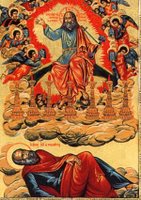Adding to or Subtracting from “the Book”
Q: Revelation says that nothing should be added and nothing taken away from “this book.” Does this mean the Bible or just the book of Revelation? I’m Christian and thought it meant the whole Bible, but a Mormon elder claims it is just that book. I think he just said that so he could use it to make his point, because we were having a long discussion about the differences between Mormonism and Christianity. He said that theologians know it just refers to Revelation; that is why the Mormons can add the Book of Mormon to their “holy books.”
 A: Revelation is, in part, a commentary on all of history from a divine perspective. Thus, even if the warning against adding to or subtracting from “the book” only means Revelation, it still doesn’t give the Mormons or anyone else a green light to start adding to the Scriptures.
A: Revelation is, in part, a commentary on all of history from a divine perspective. Thus, even if the warning against adding to or subtracting from “the book” only means Revelation, it still doesn’t give the Mormons or anyone else a green light to start adding to the Scriptures.This being said, I must say that while I disagree with their intent, I do agree with the elder in one regard: The primary thrust of the comments appears to concern only the Revelation. This is more apparent when you read all of Chapter 22, where most translations use “this book” either six or seven times, depending upon their rendering of verse 19. The continuing emphasis on the “words of the prophecy” strongly indicates that the referenced “book” is the one John is commanded to write.
This is even more certain when you realize that the Bible had not reached its final form at the time that the Apocalypse was recorded. The one book we call the Bible was still many books that Christians would wrestle over, debating whether or not they should be included. The position of Revelation at the end of the New Testament is not only testimony to its lateness of writing, but also because of arguments over its inclusion.
Most of the ending books of the New Testament had a number of critics among those who struggled to compare various writings and determine which had apostolic authorship or agreed with other Scriptures (including the Old Testament and the more accepted post-Jesus books, such as most of the Pauline Epistles and the Gospels). From these efforts, the Bible we know was finally gathered, as the Church became convinced that certain books were truly inspired by God.
Yet even if the prohibition is only for Revelation, that means that not only the literal words are “sacred,” but also their full intent. Thus, if the Christ of the Apocalypse (who is also the Christ of the Gospels and the Epistles and the Messiah of the Old Testament) is portrayed differently from how He is revealed, then those who do so fall under the curses. Jesus had already said of the Old Testament Scriptures that they testified of Him. And if any writings contradict the Bible, then the spirit of the prophecy of “the book” is violated.
Besides this, the Bible truly is God’s Word and any other “scriptures” must agree with it in doctrinal content and historical accuracy. To validate the “truth” of their scriptures, the Mormons must prove that their books are in harmony with all of the Bible. Yet LDS writings contradict some or all of the truth of many of the books of the Bible. While the Church of Jesus Christ of Latter-day Saints and Christianity might agree on much of the practical writing and both may accept the history at face value, much of the rest of the Bible is understood vastly differently.
The warnings in Revelation are no more or less severe than the warnings against unbelief or false prophets in earlier books of the Bible; attention should be paid to agreement in every detail of doctrine. Since Revelation is a Trinitarian exposition, any anti-Trinitarian religion, including Mormonism, cannot rightly claim it as one of its foundational scriptures.
Scripture quoted from The Holy Bible, English Standard Version™, © 2001 by Crossway Bibles.
Send email to Ask the Pastor.
Walter Snyder is the pastor of Holy Cross Lutheran Church, Emma, Missouri and coauthor of the book What Do Lutherans Believe.
Technorati Tags: LDS | Mormon | Revelation | Apocalypse | hermeneutics

1 Comments:
This was something I was and probably still have some issues with when it comes to confessional status. I'm still not convinced, but at least it makes a lot more sense at this point.
Post a Comment
<< Home